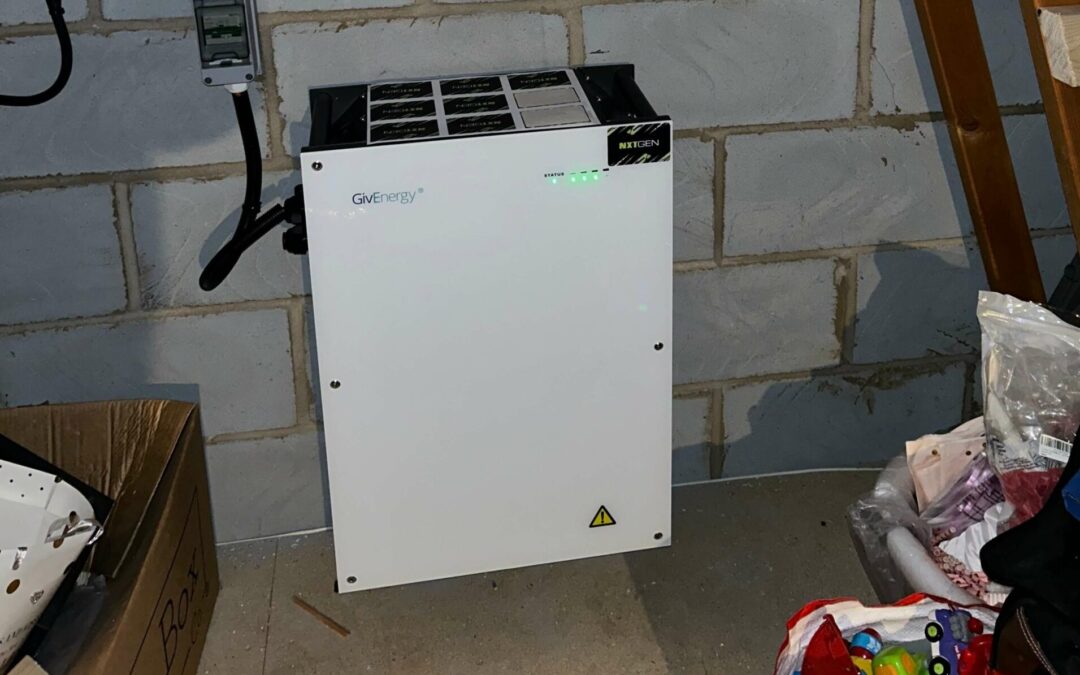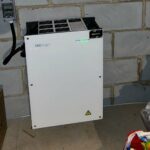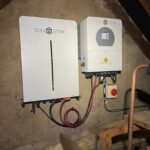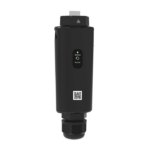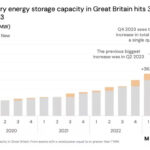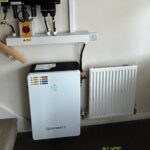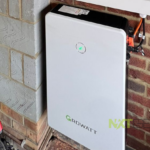Is your solar energy investment reaching its full potential? While solar panels gleaming on rooftops capture the sun’s rays, maximizing the utilization of that harnessed solar power is crucial for reaping the true rewards of clean energy. Solar battery storage holds the key, transforming your home or business into a self-sufficient energy hub. This post explores the compelling reasons why integrating solar batteries into your solar panel system might be the smartest decision you make this year.
Increased Self-Consumption and Cost Savings
- Solar battery storage empowers you to maximize the utilization of your solar-generated electricity. Compared to potentially lower buyback rates for surplus solar energy, storing excess solar energy for personal use allows you to capitalize on the full market value of your solar energy production.
- In time-of-use pricing scenarios, solar batteries provide cost optimization by enabling consumption during off-peak hours with stored solar energy, mitigating the impact of higher peak-time electricity rates.
Environmental and Community Benefits
- By relying more on your own solar energy, you contribute to reduced National Grid dependence and a cleaner environment through lower overall energy consumption. This translates to cleaner air and a healthier community.
Enhanced Reliability and Peace of Mind
- For areas with unreliable National Grid infrastructure, integrating solar batteries with appropriate equipment can provide backup power, ensuring your essential home appliances and devices stay operational during outages.
Investment Considerations
- While the initial cost of solar battery systems is a primary factor, a comprehensive financial analysis is crucial to determine the investment’s payback period and long-term profitability.
Factors Influencing Profitability
- The Smart Export Guarantee (SEG) scheme’s low buyback rates make self-consumption through solar battery storage financially attractive.
- Energy usage patterns significantly impact the value proposition. For instance, working from home or strategically managing energy loads might lessen the immediate need for solar batteries.
Simplified Cost Analysis
- Battery Cost: Compare quotes for solar PV systems with and without solar batteries to understand the incremental cost of adding storage. Remember you are not only comparing the cost of the battery, but also the cost of installation by an MCS Certified Battery Storage Installer like NXTGEN Energy Ltd., so it’s Battery Cost + Installation Cost = Total Cost.
- Battery Size: Determine the optimal solar battery capacity in kWh (kilowatt hour), considering an average of 80% maximum charge recommendation for prolonged battery life.
- Charge Cycles: Use a standard value of 6,000 charge cycles for estimation, as most solar batteries are rated for 6,000 cycles over their normal lifespan.
Example Calculation
- Battery Cost + Installation: £5,000 – £6,000
- Battery Storage Size: 6.5 kWh
- Charge Cycles: 6,000
Total kWh stored over the battery’s lifespan: 31,200 kWh (6,000 cycles x 6.5 kWh x 80%)
Cost per stored kWh: £5,000 – £6,000 / 31,200 kWh = 16.0 – 19.2 pence
To justify the investment in solar battery storage, savings per stored kWh must exceed 16.0 – 19.2 pence. This benefit could potentially double in scenarios with very low buyback rates.
Additional Points
- Future electricity price increases can further enhance the financial benefits of solar battery storage.
- Lithium-ion batteries are the prevalent and preferred choice in the UK due to their reliability and performance.
Conclusion
While a comprehensive analysis is recommended, this information provides a solid foundation for evaluating the potential benefits and financial merits of integrating solar battery storage into your solar panel system. We are committed to guiding you towards the most optimal solution for your energy needs and a brighter future.
As we navigate towards a more sustainable energy future, it’s clear that solar batteries play a vital role in optimizing the performance and economic viability of solar panel installations. By providing a means to store and utilize surplus solar energy, batteries contribute to National Grid independence, peak demand management, and overall cost savings. As technology continues to advance and the importance of clean energy intensifies, the marriage of solar panels and solar batteries stands as a beacon of hope for a greener and more sustainable world. Contact us today on 01268 928 690 or click on the ‘Enquire Now’ button below to learn more about how solar batteries can benefit your home or business!
FAQ: Solar Battery Storage
Solar batteries act as energy banks, storing excess solar power generated during the day for use when the sun isn’t shining. This smooths out energy production and helps you rely less on the National Grid for your energy needs.
Common choices include:
Lithium-ion: Compact, efficient, long lifespan, but pricier.
Lead-acid: Affordable, less efficient, good for larger systems.
Flow batteries: Scalable, safe, promising for large-scale storage.
Batteries offer several benefits:
Energy independence: Reduce reliance on the National Grid and potentially lower your electricity bills.
Smooth power supply: Enjoy consistent power even at night or during cloudy days.
Cost savings: Avoid peak demand charges by using stored solar energy during expensive times.
Potential income: Sell surplus energy back to the National Grid in some regions through the SEG Scheme.
The main drawbacks are:
Initial cost: Adding a battery increases the upfront investment for your solar PV system.
Lifespan: Batteries eventually need replacement, though newer technologies are improving durability.
Maintenance: Requires periodic monitoring and care to ensure optimal performance.
Check out the National Grid website for reliable information and recommendations on battery storage for solar system installations. You can also contact professional solar panel installers like NXTGEN Energy for personalized advice.
Bonus tip: Remember, investing in solar battery storage is a decision based on your specific needs and energy usage patterns. Talk to a solar energy expert like NXTGEBN Energy to determine if battery storage is the right choice for you!
Latest Solar Battery Storage Posts
- Duracell Dura5: A Safe and Scalable Home Battery SolutionThe Duracell Dura5 Battery is shaking up the residential energy storage scene with its commitment to safety, performance, and adaptability. This Lithium Iron Phosphate (LiFePO4) battery system packs a punch with a 5.12kWh capacity (4.6kWh usable) and a reassuring 10-year warranty, ensuring long-lasting peace of mind for consumers. Safety First: The Power of LiFePO4 Chemistry… Read more: Duracell Dura5: A Safe and Scalable Home Battery Solution
- The Value Proposition of Battery Storage for Solar Panel SystemsIs your solar energy investment reaching its full potential? While solar panels gleaming on rooftops capture the sun’s rays, maximizing the utilization of that harnessed solar power is crucial for reaping the true rewards of clean energy. Solar battery storage holds the key, transforming your home or business into a self-sufficient energy hub. This post… Read more: The Value Proposition of Battery Storage for Solar Panel Systems
- SunSynk Batteries: Innovative Energy StorageSunSynk Batteries have emerged as a leading solution in the realm of energy storage, offering a range of innovative features and benefits that cater to various applications. With a focus on sustainability and cutting-edge technology, SunSynk Batteries have captured the attention of residential, commercial, and industrial consumers alike. This blog post delves into the intricate… Read more: SunSynk Batteries: Innovative Energy Storage
- Solar Industry Update: Battery Installations in LoftsThe British Standards Institute (BSI) has recently released new recommendations regarding home battery installations, including those in loft spaces. One common inquiry we receive from our customers following the publication of the Publicly Available Specification (PAS) is whether a solar battery can be installed in a loft. The answer is a resounding yes, with some… Read more: Solar Industry Update: Battery Installations in Lofts
- Who are NXTGEN Energy Ltd?NXTGEN Energy Ltd are a solar energy company based in Rayleigh, Essex, UK. They specialize in the installation of solar panels, battery storage systems, and electric vehicle chargers for homes and businesses across the UK. They are MCS certified, which means they meet the Microgeneration Certification Scheme’s standards for quality and safety. This makes them… Read more: Who are NXTGEN Energy Ltd?
- Quick Guide to Solar Batteries and StorageThe Sun: Our Brightest Battery The world of renewable energy is a constantly evolving landscape, and solar power has emerged as a clear leader in the race towards sustainability. As the demand for clean and efficient energy solutions soars, so does the importance of understanding the key components that make solar installations truly effective. One… Read more: Quick Guide to Solar Batteries and Storage
- How to Monitor Your Growatt Inverter with the Shine LAN-X DongleIf you have a Growatt inverter and you want to monitor its performance and status online, you might be interested in the Shine LAN-X dongle. This is a device that connects your inverter to your router via an Ethernet cable, allowing you to access the Shine Server platform and view your data on your computer… Read more: How to Monitor Your Growatt Inverter with the Shine LAN-X Dongle
- Solar Panel FinancingAt NXTGEN, we are committed to delivering excellent service and we understand that many customers may prefer the option of paying for their solar panels with finance. So, we’ve partnered with established credit brokers, Ideal4Finance, to enable customers to spread the cost of purchase with manageable monthly payments. We can offer 3 Flexible Finance Options… Read more: Solar Panel Financing
- Q4 2023 Marks Record Increase in Battery Energy Storage CapacityIn a significant development for the renewable energy sector, the end of 2023 witnessed the largest quarterly surge in battery energy storage. According to Modo Energy (https://modoenergy.com), a renowned energy research consultancy, a staggering 420MW of new battery energy storage capacity became commercially operational during this period. This remarkable achievement represents a remarkable 13% increase… Read more: Q4 2023 Marks Record Increase in Battery Energy Storage Capacity
- No More VAT On Solar Battery StorageUK Government announces 0% VAT on Solar Battery Storage Systems In a momentous announcement made in December 2023, the UK government has revealed substantial reforms to the current VAT relief on the installation of qualifying energy-saving measures. This development is cause for celebration among energy enthusiasts like us! Expanding on Chancellor Rishi Sunak’s previous announcement… Read more: No More VAT On Solar Battery Storage
- How to Monitor Your Growatt Inverter with the ShinePhone AppIf you have a Growatt inverter and you want to monitor its performance and status on your smartphone, you might be interested in the ShinePhone app. This is a mobile application that connects to the Growatt monitoring platform and allows you to access your inverter data anytime, anywhere. In this blog post, we will explain… Read more: How to Monitor Your Growatt Inverter with the ShinePhone App
- Growatt BatteriesGrowatt Batteries: A Smart Choice for Home Energy Storage If you are looking for a reliable, safe, and long-lasting battery solution for your home solar system, you might want to consider Growatt Batteries. Growatt is a leading manufacturer of solar inverters and battery storage systems, with over 10 years of experience and a global presence.… Read more: Growatt Batteries

